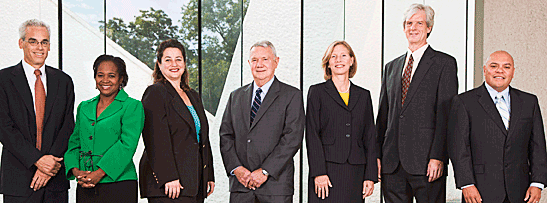Travis County
Trust, but verify
Announcing the Government Accountability Project
Commissioners approve Central Health performance audit
Criminal Complaint Hits Commissioner Daugherty
Criminal Complaint Hits Commissioner Daugherty
Save Our Springs Alliance files complaint a day
before vote to fund State Highway 45 project
by Ken Martin
© The Austin Bulldog 2014
Posted Monday, March 17, 2014 8:29pm
 The Save Our Springs Alliance filed a criminal complaint with the Travis County Attorney’s Office today, alleging that Travis County Commissioner Gerald Daugherty had violated the Texas Public Information Act by not turning over his correspondence related to the proposed controversial State Highway 45 Southwest. (See: SOS Alliance Criminal Complaint re: Travis County Commissioner Gerald Daugherty)
The Save Our Springs Alliance filed a criminal complaint with the Travis County Attorney’s Office today, alleging that Travis County Commissioner Gerald Daugherty had violated the Texas Public Information Act by not turning over his correspondence related to the proposed controversial State Highway 45 Southwest. (See: SOS Alliance Criminal Complaint re: Travis County Commissioner Gerald Daugherty)
The complaint came the day before the Travis County Commissioners Court could vote to approve an initial payment of $2.5 million to help pay for design and construction of SH45 SW and to be obligated to pay an additional $12.5 million by October 30.
The SOS Alliance has long opposed the construction of SH45 SW over the sensitive recharge zone of the Barton Springs Edwards Aquifer. Daugherty has spearheaded efforts to get SH45 SW built.
The timing of the vote is important, given the recent Democratic Primary election. Former Travis County Commissioner Sarah Eckhardt is the Democratic nominee for county judge, and former City Council Member Brigid Shea is the party’s nominee for the Precinct 2 county commissioner’s seat that Eckhardt vacated to run for county judge. Both are unlikely to support the new highway.
Deferred Prosecution Ends Open Meetings Investigation
- Deferred Prosecution Ends Open Meetings Investigation
- Mayor and five current council members sign agreements
- waiving the statute of limitations and requiring major reforms
- by Ken Martin
- © The Austin Bulldog 2012
- Posted Wednesday, October 24, 2012 11:54pm

 Travis County Attorney David Escamilla today issued a seven-page press release to announce the results of an investigation that began 21 months ago into the question of whether then-members of the Austin City Council violated the Texas Open Meetings Act.
Travis County Attorney David Escamilla today issued a seven-page press release to announce the results of an investigation that began 21 months ago into the question of whether then-members of the Austin City Council violated the Texas Open Meetings Act.
“This investigation was always about compliance with the Texas Open Meetings Act (TOMA) and other legal standards requiring transparency at City Hall, which are crucial to ensuring a government that is accountable and responsive to its citizens,” Escamilla’s statement says.
The investigation found no evidence of corruption, but voluminous proof of communications among the mayor and council members by every means possible, the sum of which violate the criminal provisions of the Act.
The agreements signed by each elected official affirm long lists of detailed, specific communications among the council members that constitute probable cause. These include specific dates on which a quorum of the council communicated face-to-face, in phone calls, and via e-mail and text messages.
Why is Apple Getting Tax Incentives?
Austin Won Apple Without Competition
‘The Arizona Republic’ Reported
by Ken Martin
© The Austin Bulldog 2012
 The Arizona Republic, that state’s largest newspaper, yesterday reported that Phoenix was never in the running to attract the Apple Inc. facility for which Texas has committed tax incentives, and both Austin and Travis County are considering doing likewise.
The Arizona Republic, that state’s largest newspaper, yesterday reported that Phoenix was never in the running to attract the Apple Inc. facility for which Texas has committed tax incentives, and both Austin and Travis County are considering doing likewise.
Governor Rick Perry is offering Apple $21 million in incentives over 10 years and the City of Austin is considering sweetening the deal with $8.6 million, according to the Austin American-Statesman. Travis County is also considering incentives.
Those incentives were based on the premise that Apple was considering Phoenix and Austin.
However, The Arizona Republic’s story published yesterday reported Phoenix “never had a chance” because the proposed site was on state land and “state trust land did not excite them” (Apple), so there was no Phoenix site reasonably in contention.”
BCCP Celebration
Looks Back On 15 Years of Accomplishments
Preserve Still Short of Acreage But Provides
a Lasting Legacy for Future Generations
by Ken Martin
© The Austin Bulldog 2011
 Spirits were high on May 2, 1996, when Nancy Kaufman, regional director of the U.S. Fish and Wildlife Service, signed the permit at 10:24am, the stamp of approval obtained through the Balcones Canyonlands Conservation Plan (BCCP). The plan called for the creation of a preserve system (the Balcones Canyonlands Preserve or BCP) to protect endangered and at-risk species. The overcast morning cooled temperatures and saved a lot of sweat for those who attended the invitation-only celebration, including Interior Secretary Bruce Babbitt, former U.S. Representative J.J. “Jake” Pickle, and other dignitaries.
Spirits were high on May 2, 1996, when Nancy Kaufman, regional director of the U.S. Fish and Wildlife Service, signed the permit at 10:24am, the stamp of approval obtained through the Balcones Canyonlands Conservation Plan (BCCP). The plan called for the creation of a preserve system (the Balcones Canyonlands Preserve or BCP) to protect endangered and at-risk species. The overcast morning cooled temperatures and saved a lot of sweat for those who attended the invitation-only celebration, including Interior Secretary Bruce Babbitt, former U.S. Representative J.J. “Jake” Pickle, and other dignitaries.
Holding the permit aloft after signing it, Kaufman said, “It looks like it’s made out of paper but it’s really made out of blood, sweat and tears.”
That was not an exaggeration, considering the plan was eight years in the making. From 1988 through 1996, concerned citizens, business leaders, landowners, developers, environmental groups, scientists and the Fish and Wildlife Service collaborated to create a Habitat Conservation Plan that allowed the permit to be issued under the Endangered Species Act.
We were bussed in that morning amid tight security that blocked access by the protesters, who had massed outside the gate to Reicher Ranch on Ranch Road 620. Inside, we stood amid the junipers and watched turkey vultures coasting lazily on the currents overhead. Remarks were purposely kept short so that all in attendance would have time to sign the registry that would stand as testimony to this unique achievement, which Babbitt called, “the very first place in the United States we have produced an urban conservation plan.”
Kerry Tate, chair of the Greater Austin Chamber of Commerce said, “In developer’s terms, we could shout, ‘Done deal.’”
But Babbitt issued a warning: “I recognize this as the end of the beginning, not the beginning of the end. We’ve got a long way to go.”
The irony of this project being ramrodded by Babbitt, who said he was drawn to the challenge of working on the Endangered Species Act for President Bill Clinton, is that around here Babbitt wasn't exactly thought of as a friend of the environment. As I later wrote in the July 2002 edition of The Good Life magazine, in a story titled “The Life and Death of Barton Springs,” it took two federal lawsuits filed by the Save Our Springs Alliance to force Babbitt to finally declare the Barton Springs Salamander an endangered species in 1997.
But then, theBalcones Canyonlands Conservation Plan was not simply about the environment. It gave landowners who wanted to develop or otherwise alter habitat for endangered species that’s outside the preserve boundaries an alternative to seeking an individual permit from the Fish and Wildlife Service (FWS). The FWS permitting process requires development of an individual habitat conservation plan tailored to the project and may require additional habitat to be set aside.
The Balcones Canyonlands Conservation Plan offered landowners a faster process administered by Travis County in which they could buy participation certificates to allow development in habitat located outside the preserve.
On May 13, 2011, fifteen years after the BCCP permit was signed, there were no protesters at the gate and precious little cloud cover to ward off the heat, but the spirit of the event was again one of celebration.
Bad press, mea culpas
Bulldog’s Complaint Dismissed
City of Austin Committed Alleged Violations
Bulldog’s Complaint Was the First Presented
for Violation of Texas Pubic Information Act
by Ken Martin
© The Austin Bulldog 2011
The Travis County attorney’s office today issued a response to The Austin Bulldog’s complaint that alleged the City of Austin had violated the Texas Public Information Act by withholding public information.
The letter signed by James W. Collins, executive assistant Travis County attorney, states that the county attorney’s office “cannot determine that the violations alleged in your complaint were committed by the City of Austin.”
The letter states that this was a first complaint received by the Travis County Attorney’s office that was filed under Section 552.3215 of the Texas Public Information Act.
Attorney Bill Aleshire of Riggs Aleshire and Ray LP, who represented The Austin Bulldog in this matter, said, “This decision does not say the county attorney’s office exonerated the city, just that the county attorney’s office could not determine that the violations occurred as worded in the complaint.







